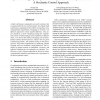Free Online Productivity Tools
i2Speak
i2Symbol
i2OCR
iTex2Img
iWeb2Print
iWeb2Shot
i2Type
iPdf2Split
iPdf2Merge
i2Bopomofo
i2Arabic
i2Style
i2Image
i2PDF
iLatex2Rtf
Sci2ools
111
click to vote
IPPS
2002
IEEE
2002
IEEE
Optimal Remapping in Dynamic Bulk Synchronous Computations via a Stochastic Control Approach
A bulk synchronous computation proceeds in phases that are separated by barrier synchronization. For dynamic bulk synchronous computations that exhibit varying phase-wise computational requirements, remapping at run-time is an effective approach to ensure parallel efficiency. This paper introduces a novel remapping strategy for computations whose workload changes can be modeled as a Markov chain. It is shown that optimal remapping can be formulated as a binary decision process: remap or not at a given synchronizing instant. The optimal strategy is then developed for long lasted computations by employing optimal stopping rules in a stochastic control framework. The existence of optimal controls is established. Necessary and sufficient conditions for the optimality are obtained. Furthermore, a policy iteration algorithm is devised to reduce computational complexity and enhance fast convergence to the desired optimal control.
Bulk Synchronous Computations | Distributed And Parallel Computing | IPPS 2002 | Optimal Control | Optimal Remapping |
| Added | 15 Jul 2010 |
| Updated | 15 Jul 2010 |
| Type | Conference |
| Year | 2002 |
| Where | IPPS |
| Authors | Gang George Yin, Cheng-Zhong Xu, Le Yi Wang |
Comments (0)

